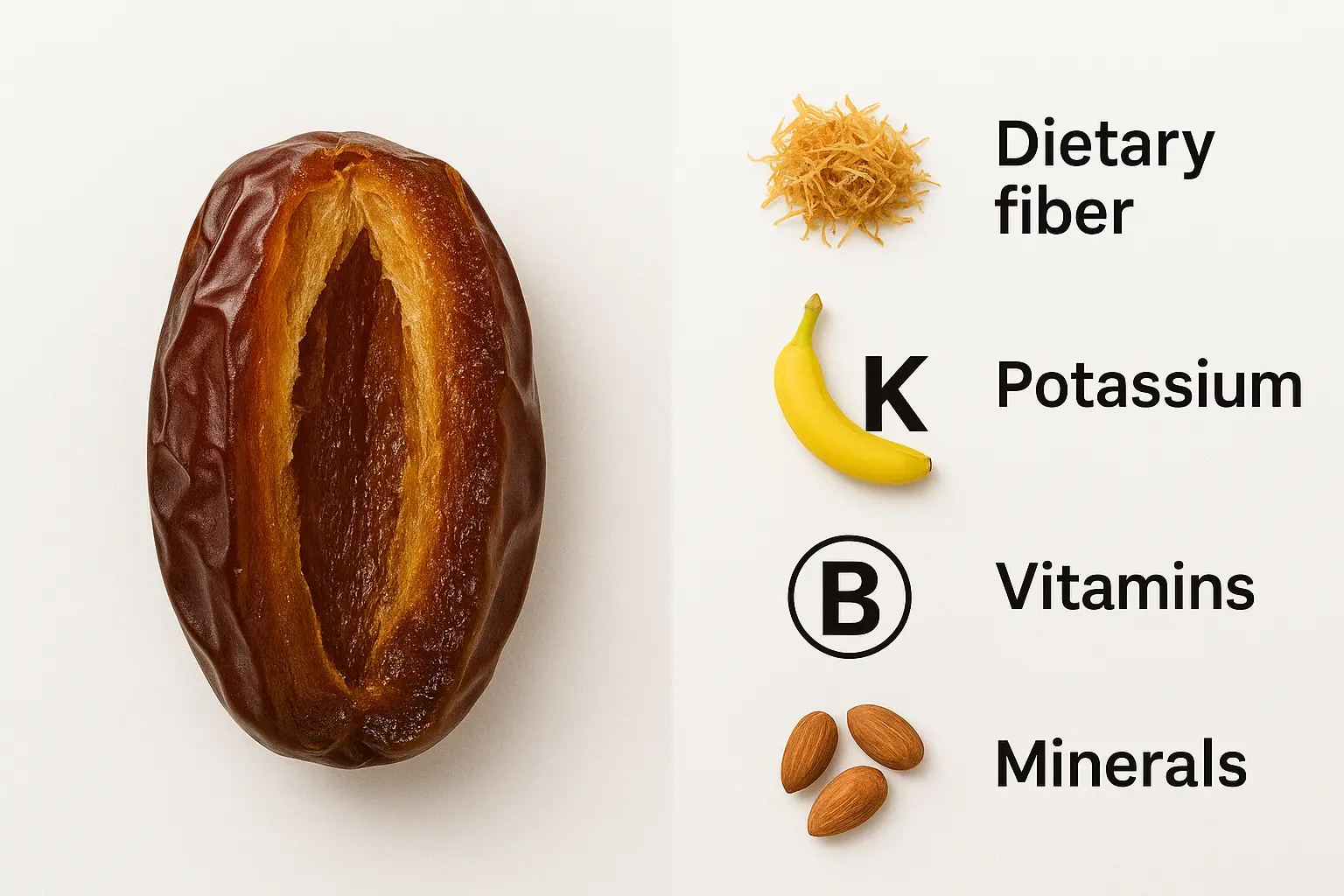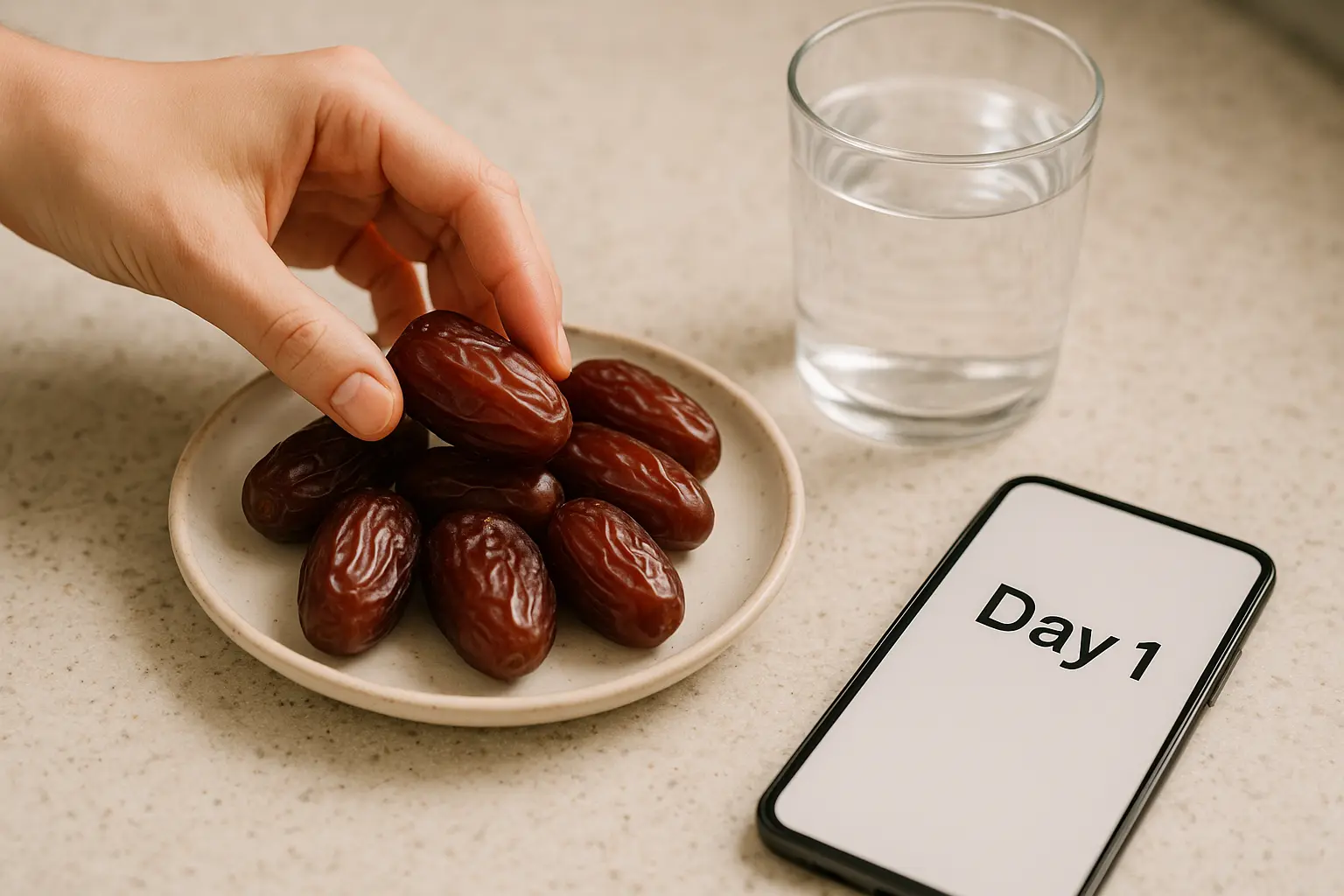Dates are renowned not just for their sweet, rich flavor but also for their remarkable health benefits. As a staple food in Middle Eastern diets for thousands of years, dates have been revered not only as a source of energy but also for their medicinal properties. This dried fruit is emerging as a real superfood, especially when considering its effects on sexual health and vitality.
By exploring how dates can enhance your well-being and potentially boost your sexual health, this article will delve into the scientific and nutritional merits of incorporating dates into your diet. Whether you’re looking to boost your energy, improve your dietary intake, or enhance your sexual health, dates offer a natural solution packed with numerous benefits.
Nutritional Profile of Dates
Dates are a powerhouse of nutrition. They are densely packed with essential nutrients that can significantly benefit your overall health:
- Calories and Sugars: A 100-gram serving of dates provides about 277 calories, mostly from sugars, making them a high-energy snack.
- Fibers: With nearly 7 grams of fiber per 100 grams, dates are excellent for digestive health.
- Vitamins: Dates are rich in B vitamins, particularly B6, which plays a vital role in brain health. They also contain modest amounts of Vitamin K and niacin.
- Minerals: They are an excellent source of potassium and magnesium, crucial for heart health and muscle function. Dates also provide copper, manganese, and iron, which are essential for healthy blood and bones.
- Antioxidants: Dates contain carotenoids and phenolic acid, which have anti-inflammatory properties and help fight oxidative stress in the body.
This nutritional makeup makes dates not just a quick source of energy but also a beneficial food for long-term health maintenance, particularly in enhancing sexual health due to improved circulation and natural sugar content.
Health Benefits of Dates
Dates are more than just a sweet treat; their health benefits are vast and significant. Here are several ways in which dates can positively impact your health:
- Energy Boost: Dates are rich in natural sugars, such as glucose, fructose, and sucrose, which provide a quick and efficient energy boost. This makes them an excellent snack for mid-day slumps or pre/post-workout.
- Digestive Health: The fiber in dates not only helps to prevent constipation but also acts as a prebiotic, promoting healthy gut bacteria. Regular consumption can help maintain a balanced digestive system.
- Heart Health: Dates are a great source of potassium, which is known to lower stroke risk and help regulate blood pressure. Their low sodium content also makes them a heart-healthy choice.
- Anti-inflammatory Properties: Dates contain antioxidants such as flavonoids, carotenoids, and phenolic acid, which help reduce inflammation and can lower the risk of diseases like Alzheimer’s and certain cancers.
- Bone Health: Minerals such as phosphorus, potassium, calcium, and magnesium found in dates make them beneficial for preventing bone-related disorders like osteoporosis and enhancing bone strength.
By incorporating dates into your daily diet, you can enjoy these varied health benefits, contributing to overall wellness and disease prevention.

Dates and Sexual Health
The impact of dates on sexual health is an intriguing aspect of their nutritional profile. Here are a few ways dates may enhance sexual health:
- Natural Aphrodisiac: Dates contain high levels of estradiol and flavonoids, which can increase sperm count and motility, potentially enhancing male fertility.
- Energy and Stamina: The natural sugars in dates provide sustainable energy, which can be beneficial in enhancing stamina and endurance, important factors in sexual performance.
- Nervous System Support: B vitamins in dates, especially vitamin B5 (pantothenic acid), are crucial for the healthy functioning of the nervous system. This can enhance body sensitivity, which is linked to sexual responsiveness.
- Stress Reduction: Dates can help combat stress and depression, which are common psychological factors that affect sexual desire and performance. The presence of vitamins like B6 in dates helps in the production of neurotransmitters like serotonin, which regulates mood.
Incorporating dates into your diet might not only benefit your health in general but also enhance aspects of sexual health, making it a dual-purpose superfood.
How to Incorporate Dates Into Your Diet
Incorporating dates into your daily diet is a delicious way to boost your nutrient intake. Here are several practical and tasty ways to enjoy dates:
1. Breakfast Boost:
- Smoothies: Add dates to your morning smoothie for a natural sweetness and a fiber boost.
- Oatmeal or Yogurt: Chop a few dates and sprinkle them over your oatmeal or mix into your yogurt. This adds a rich, caramel-like sweetness.
2. Healthy Snacking:
- Energy Bars: Blend dates with nuts and seeds to make homemade energy bars, perfect for a midday snack.
- Stuffed Dates: For a quick and satisfying snack, stuff dates with nut butter or soft cheese like goat cheese or cream cheese.
3. Creative Meals:
- Salads: Chop dates and add them to salads for a touch of sweetness that balances well with savory dressings.
- Cooked Dishes: Incorporate dates into savory dishes such as tagines, stews, or as a topping on roasted vegetables.
4. Desserts:
- Baking: Use dates as a natural sweetener in baking recipes like cakes, muffins, and cookies.
- Dessert Toppings: Puree dates into a paste and use it as a topping for ice cream or pancakes.
5. Drinks:
- Date Milk: Blend milk (dairy or non-dairy) with dates and a pinch of cinnamon or vanilla for a deliciously sweet drink.
- Tea: Add a few chopped dates to your tea while it steeps for added sweetness.

By making dates a part of your daily eating habits, you can enjoy their health benefits in a variety of tasty ways. Whether you’re looking for an energy boost, a sweet treat, or a flavorful addition to meals, dates are versatile enough to meet all these needs.
The 3-Day Date Challenge
Incorporating dates into your diet can have numerous health benefits, and the 3-Day Date Challenge is designed to help you experience these benefits quickly and effectively. This challenge involves consuming a specific amount of dates along with water every three hours over the course of three days. Here’s how to do it:
1. What You Need:
- Dates: Prepare to consume 7 dates every three hours each day. Choose fresh, high-quality dates for the best taste and nutritional benefits.
- Water: Drink at least one glass of water with each serving of dates to aid digestion and hydration.
2. Schedule:
- Morning Start: Begin your day with 7 dates and a glass of water as soon as you wake up.
- Regular Intervals: Continue to eat 7 dates with a glass of water every three hours throughout the day.
- Evening End: Your last intake should be at least an hour before you go to bed to ensure a comfortable night’s sleep.
3. Expected Outcomes:
- Energy Levels: You may notice a significant boost in energy due to the high natural sugar content in dates.
- Digestive Health: The fiber in dates can help regulate digestion and promote regular bowel movements.
- Overall Well-being: The nutritional content of dates, including vitamins, minerals, and antioxidants, contributes to overall health.
4. Considerations and Tips:
- Monitor Your Body: Pay attention to how your body reacts. If you experience any discomfort, adjust the amount of dates or the frequency accordingly.
- Balanced Diet: While participating in this challenge, maintain a balanced diet. Dates are nutritious but should complement a diet containing a variety of other foods.
- Consultation: If you have any health conditions, consult with a healthcare provider before starting this or any dietary challenge.

This 3-Day Date Challenge is a great way to harness the potent benefits of dates in a concentrated period. It can serve as a reset to boost your energy and improve your digestive health.
Potential Side Effects and Considerations
While dates are a nutritious and beneficial addition to most diets, there are some potential side effects and considerations to keep in mind, especially when consumed in large quantities:
1. Caloric Intake:
- High Sugar Content: Dates are high in natural sugars, which means they are also high in calories. Consuming too many dates can lead to weight gain if not balanced with other dietary needs and physical activity.
2. Digestive Issues:
- Fiber Overload: Although the fiber in dates is beneficial for digestion, excessive intake can lead to digestive discomfort such as bloating, gas, or diarrhea. It’s important to increase fiber consumption gradually and ensure adequate hydration.
3. Blood Sugar Levels:
- Glycemic Impact: For individuals with diabetes or blood sugar management issues, the high sugar content in dates can cause spikes in blood glucose levels. It’s advisable to monitor blood sugar levels and consult with a healthcare provider.
4. Allergies and Sensitivities:
- Food Sensitivities: While rare, some people might be allergic or sensitive to dates. Symptoms could include itching, swelling, or gastrointestinal distress. If you suspect a food allergy, it’s important to consult with a healthcare professional.
5. Interactions with Medications:
- Medication Interference: Due to their vitamin K content, dates can interfere with blood-thinning medications like warfarin. Always check with a healthcare provider if you have concerns about food-drug interactions.
6. Dietary Balance:
- Nutrient Imbalance: Relying heavily on dates for nutritional intake can lead to an imbalance in nutrient consumption. It’s crucial to maintain a varied diet to ensure you receive a balanced mix of nutrients.
By being aware of these potential side effects and considerations, you can better integrate dates into your diet in a way that maximizes their benefits while minimizing any adverse effects.
Comparison of Dates with Other Natural Aphrodisiacs
Dates are often touted for their potential benefits in enhancing sexual health, but how do they compare to other natural aphrodisiacs? Here’s a look at some popular alternatives and how dates stand up against them:
1. Oysters:
- Nutrients: Oysters are well-known for their high zinc content, which is essential for testosterone production and reproductive health.
- Comparison: While dates don’t contain zinc, they offer a broader range of vitamins and minerals that support general vitality and energy levels.
2. Chocolate:
- Mood Enhancer: Chocolate contains phenylethylamine, a chemical that can induce feelings of excitement and happiness.
- Comparison: Dates may not induce mood swings directly, but their high fiber and natural sugars help maintain stable blood sugar levels, which can improve overall mood stability.
3. Maca Root:
- Energy and Mood Booster: Maca is often used to increase stamina, energy, and sexual function.
- Comparison: Dates similarly boost energy due to their high natural sugar content, but without the potential hormonal effects that maca may have.
4. Ginseng:
- Stimulant: Ginseng is reputed to enhance sexual stamina and has been used for this purpose in traditional medicine.
- Comparison: Dates offer sustained energy but are not directly stimulating; they support overall health, including sexual health, by providing essential nutrients.
5. Bananas:
- Nutrient-Rich: Bananas are high in potassium and B vitamins, which are necessary for hormone production.
- Comparison: Dates also contain these nutrients, plus they add antioxidants and fiber, which are beneficial for overall health and well-being.
By comparing dates with other natural aphrodisiacs, it’s clear that while some foods may have a more direct effect on sexual health, dates provide a comprehensive range of health benefits that can support sexual vitality indirectly but sustainably.
Scientific Backing and Skepticism
While the health benefits of dates are widely promoted, it’s essential to consider both the scientific backing and the skepticism that surrounds these claims. Here’s an analysis of what the science says and where doubts still exist:
1. Scientific Support:
- Antioxidants and Nutrients: Numerous studies have confirmed that dates are rich in antioxidants and essential nutrients, which contribute to their health benefits, including reducing oxidative stress and improving heart health.
- Dietary Fiber: The high fiber content in dates is well-documented and is known to support digestive health and regular bowel movements.
- Blood Sugar Management: Despite their high sugar content, some research suggests that dates have a low glycemic index and can be included in the diets of people with diabetes, due to their fiber content that helps to moderate blood sugar levels.
2. Areas of Skepticism:
- Sexual Health Claims: While dates are touted for improving sexual health, there is limited direct scientific research to fully support these claims. Most evidence is anecdotal or derived from traditional uses rather than rigorous scientific studies.
- Weight Management: Due to their calorie density, there is some skepticism about the role of dates in weight management. Overconsumption can lead to caloric excess, potentially offsetting their health benefits.
- Broad Health Claims: Some of the broader health claims associated with dates lack substantial clinical evidence and require more research to be universally accepted.
3. A Balanced Perspective:
- It’s important for consumers to have a balanced perspective about dates. While they are undeniably nutritious, expecting miraculous health benefits from any single food item is unrealistic.
- Health enthusiasts and consumers are encouraged to incorporate dates as part of a varied and balanced diet rather than relying on them as a panacea.
This critical examination helps in understanding the realistic benefits of dates and encourages a healthy skepticism about superfoods, ensuring that dietary choices are informed by both science and personal health needs.
User Experiences and Anecdotes
Hearing from individuals who have incorporated dates into their diets can provide valuable insights into the real-world effects of this superfood. Here, we explore various anecdotes and user experiences that highlight both the benefits and the occasional downsides of consuming dates:
1. Positive Experiences:
- Energy and Vitality: Many users report an increase in energy and overall vitality after regularly incorporating dates into their diets. The natural sugars and nutrients in dates are often credited for this boost.
- Digestive Benefits: Individuals with constipation or other digestive issues frequently mention the relief they find through the regular consumption of dates, due to their high fiber content.
- Improved Sexual Health: Some users, especially men, claim improved sexual stamina and health after consuming dates regularly, although such experiences are often based on personal perception and lack scientific backing.
2. Negative Experiences:
- Weight Gain: A few users have noted weight gain, which they attribute to the high calorie and sugar content of dates. This underscores the importance of moderation in consumption.
- Blood Sugar Spikes: People with diabetes have reported that consuming dates in large quantities can lead to spikes in blood sugar levels, suggesting that such individuals need to monitor their intake carefully.
- Allergic Reactions: Though rare, there are reports of allergic reactions to dates, which include symptoms like itching and gastrointestinal discomfort.
3. General Feedback:
- Taste and Versatility: Many enjoy the taste of dates and appreciate their versatility in both sweet and savory dishes.
- Easy to Incorporate: Users often point out how easy it is to include dates in the diet, whether as a snack or as part of various recipes.
These anecdotes provide a spectrum of experiences that can help potential consumers make informed decisions about adding dates to their diets.
Frequently Asked Questions (FAQs) About Dates
This section aims to address common queries about dates, providing clear and concise answers to enhance understanding and debunk myths related to this nutritious fruit:
1. Are dates good for weight loss?
- Answer: Dates are high in natural sugars and calories, which can contribute to weight gain if consumed in large quantities. However, they are also high in fiber, which can promote a feeling of fullness and aid in weight management when consumed in moderation as part of a balanced diet.
2. Can diabetics eat dates?
- Answer: Despite their sweetness, dates have a relatively low glycemic index, which means they do not cause a significant spike in blood sugar levels when eaten in moderation. Diabetics should consult with their healthcare provider to determine the appropriate portion size and frequency.
3. How many dates should I eat per day?
- Answer: There is no one-size-fits-all answer, but a general recommendation is to consume about 3-7 dates daily to balance the intake of sugars and calories with the health benefits they offer.
4. What is the best time to eat dates?
- Answer: Dates can be eaten at any time of the day. They are particularly effective as a post-workout snack due to their high natural sugars, which provide a quick energy boost, or in the morning to start the day with a nutrient-rich food.
5. Are dates as healthy as other fruits?
- Answer: Dates are comparably healthy to other fruits as they offer a significant amount of fiber, vitamins, and minerals. However, due to their high sugar content, they should be consumed differently than lower-calorie fruits like apples or berries.
6. How should I store dates to keep them fresh?
- Answer: Dates should be stored in an airtight container in a cool, dry place. For longer preservation, they can be kept in the refrigerator where they can stay fresh for several months.
Conclusion: Embracing the Benefits of Dates
In exploring the remarkable qualities of dates, it’s clear that this fruit holds a special place not only in culinary traditions but also in modern health and wellness practices. From their rich nutritional profile to their versatile culinary uses, dates offer an array of benefits that can enhance one’s diet and overall health.
Key Takeaways:
- Nutritional Powerhouse: Dates are loaded with essential nutrients like fiber, vitamins, and minerals, contributing significantly to digestive health, energy levels, and disease prevention.
- Natural Sweetener: With their natural sweetness, dates are an excellent alternative to artificial sweeteners and processed sugars, making them ideal for enhancing the flavor of various dishes while providing nutritional benefits.
- Support for Sexual Health: Although more research is needed, preliminary evidence and historical use suggest that dates may offer benefits for sexual health, enhancing vitality and stamina.
- Easy to Incorporate: Whether enjoyed on their own, used in baking, or added to savory dishes, dates are incredibly versatile and easy to incorporate into daily eating habits.
As with any superfood, moderation is key. While dates are undoubtedly beneficial, they are best consumed as part of a balanced diet to fully harness their health benefits without overindulging in their natural sugars.
Moving Forward: Embrace the sweetness and health benefits of dates. Whether you’re looking to boost your energy, improve your digestive health, or simply enjoy a delicious and nutritious snack, dates are a worthy addition to your diet. Let this guide inspire you to explore the various ways dates can enrich your meals and your health.
Ressources
- Cleveland Clinic Health Essentials discusses various health benefits of dates, emphasizing their antioxidant properties, which combat free radicals and help prevent diseases like cancer and cardiovascular issues. The article also highlights the potential of dates to boost brain health due to their antioxidant content, which can prevent inflammation in the brain and possibly reduce the risk of diseases like Alzheimer’s (Weill Cornell Medicine Qatar).
- Cornell University researchers are studying the specific phytochemicals in dates and their effects on human health. Their research focuses on how these compounds, which include flavonoids and carotenoids, contribute to lowering cholesterol and reducing the risk of heart disease, among other benefits (Weill Cornell Medicine Qatar).
- Organic Facts outlines several health benefits of dates, such as aiding in constipation relief due to their high fiber content, improving vascular health through their rich polyphenol content, and potentially enhancing sexual function due to specific compounds like flavonoids that influence the central nervous system (Organic Facts).


Wow its the best website where i can get more information about healthy food and more!
Thank you❤️
Wow its the best website where i can get more information about healthy food and more!
Thank you❤️